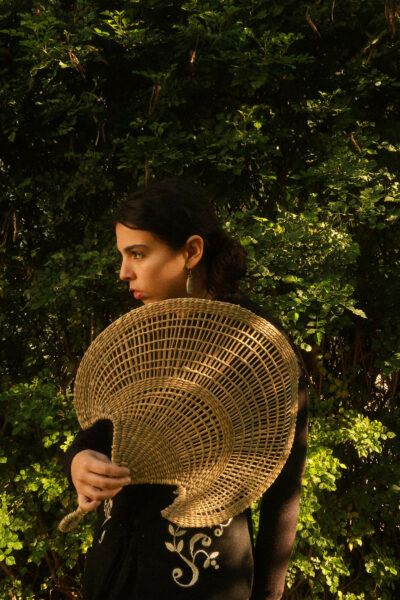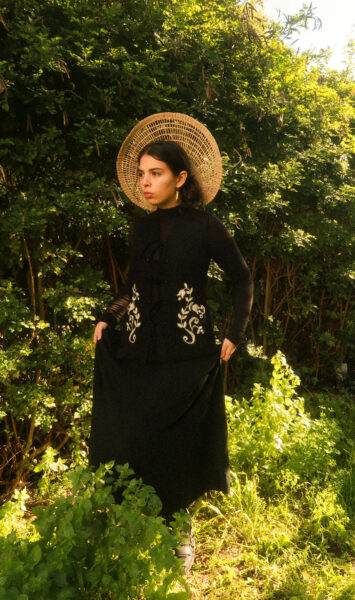The Portuguese artist Ana Lua Caiano describes her music as “a mixture between traditional Portuguese music and electronic music”. Her songs weave unique textures with traditional Portuguese harmonies and raw electronics. “I want to join the ‘old’ with the ‘new’ in my music”, Ana says. The complex rhythms and multi-layered vocals connect her to a lineage of orally preserved music that continues to be practiced in the countryside across Portugal. The singer also cites political artists from the Portuguese revolution of 1974 like Zeca Afonso, Fausto Bordalo, and Sérgio Godinho as inspiration for her sound alongside contemporary electronic influences like Portishead, Björk, and Laurie Anderson.

Photo by Joana Caiano
Backed by this broad spectrum of influences, Ana Lua Caiano first started recording music on her own during the pandemic. Her EPs Se Dançer É Só Depois (2023) and Cheguei Tarde A Ontem (2020) showcase her rhythmic sensibility and love for experimentation. On the latest single “Vou Ficar Neste Quadrado” (2024), Ana uses rhythmic acapella vocals and traditional harmonies merged with minimalistic and distorted electronics. “I have the desire to break and distort the norms. On each record, I play more with the musical elements and song structures”, Ana observes. Her songs pick up political themes like the housing crisis in Portugal and connect Ana Lua Caiano to the tradition of revolutionary Portuguese music. We caught up with the singer at the beginning of 2024 to find out more about her music and her relationship with tradition.
“When I talk about traditional Portuguese music, I’m not talking about Fado, I’m talking about a type of sonority sung in the countryside using canons, harmonies, and chorus. It was mostly transmitted orally.”
Tradition Today
Your music incorporates traditional and contemporary elements. How has traditional music shaped your creative perspective and how has electronic music?

Photo by Joana Caiano
Since a very young age, I have been listening to traditional Portuguese music, mostly on family car trips to my father’s hometown, Aveiro. That got me interested in Portuguese sonority. Later, when I was around 15 years old, I started to explore other kinds of music and take workshops about music making, synthesizers, etc. During the pandemic, I had the time and the silence to join these two kinds of music that were so important to me. From Portuguese music, I brought the ideas of canons, harmonies, and choirs, and from electronic and experimental music I brought synthesizers, sounds from daily life, and beat machines.
How do you perceive the traditional Portuguese music scene nowadays?
For me, it’s very interesting to see different music perspectives on traditional Portuguese music. Nowadays, some musicians join rock with traditional music, some join it with indie, others maintain some of the older canons… But I think each perspective is interesting and can be called traditional Portuguese music.
“I believe that traditional music evolves with the world – nowadays you can make traditional music with a computer or talk about themes that weren’t relevant, [censored], or didn’t exist in the past. Traditional Portuguese music is always evolving.”
Visuals are an important aspect. You also present yourself and the other people in the videos dressed in traditional clothing like in the video to “Mão Na Mão”. What does tradition mean to you? How does it integrate into your life?
I think preserving some parts related to our culture is important. Of course, there are some old traditions like bullfighting that I’m completely against. But when it comes to music, clothing, and some old manufacturing techniques, I think is very important to preserve them. There’s an amazing project, “Música Portuguesa A Gostar Dela Própria”, that aims to preserve songs and stories that used to be only transmitted orally. So, this is a very important project to me, and I learn a little bit about Portuguese music every day. Therefore, whenever I think it’s relevant, I incorporate elements from Portuguese traditional culture in my videos and on stage!
Music and Movements
In an interview with SAMA, you mention that you draw inspiration from music from the Portuguese Revolution of 1974, which overthrew the dictatorship in place back then. What inspires you about music from that context? How can music shape resistance and political movements?
There are a lot of amazing songs from that time that were very important for the revolution that happened in 1974. But if I had to name a song that I like the most I would name “Os Vampiros” by Zeca Afonso. This song talks about the vampires — the vampires in this case were the members of the dictatorship. Of course, during this time there was censorship so the lyrics had to be very well written, and the meaning had to be disguised so that the song wouldn’t be censored.
What impresses me the most in this song is the ability to talk about the biggest atrocities committed by the dictatorship without being too obvious or too direct. Zeca’s songs were very important for the revolution. In fact, one of his songs “Grândola, Vila Morena” was used to announce the revolution on the radio! So, music and revolution in Portugal are intrinsically connected.

Photo by Joana Caiano
What political themes surface in your creative practice and how do you approach them in the lyrics and in the music?
Some songs that I write reflect on today’s society. For example, “Casa Abandonada” reflects on the great number of houses that exist in empty city centers, while there are a lot of people without houses to live in. “Se Dançar É Só Depois” is a song that criticizes overwork encouraged by today’s society. The character in the song, despite working hard, continues to fail to have “a room for two”. To accentuate the lack of time that people have and the amount of work that people have to do, I used the sounds of clocks and machines in this song.
The traditional influences you cite are mainly men, but your music and the videos center women and female voices. How has feminism shaped your music and how does it connect to tradition?
During the dictatorship, women didn’t have the same rights as men. So, it was very rare to have a woman musician who was also a composer. Women often only were singers. Even 15 years ago you didn’t see many women singing and writing their own music in Portugal. Nowadays, you see many more women composers, and of course, being a woman seeing women who not only sing but write their music and play their music is really important to influence other women to do the same! So, I think there’s always an underlying factor connected to feminism when making music as a woman.
Portugal also has a long history of perpetrating colonial violence. How do you find ways to celebrate tradition while reckoning with history and its repercussions affecting formerly colonized countries until today?
A lot of songwriters inspired by traditional music – like Zeca Afonso and Sérgio Godinho – were very important figures who fought against colonialism and the dictatorship. So, I don’t think celebrating traditional music has anything to do with celebrating colonialism. I think in Portugal, most of the time, traditional Portuguese was a symbol against it.
“My belief is that music can be a way of repairing, thinking, and criticizing some of the colonial repercussions that still exist today.”
You can find all the recent releases on Bandcamp, Tidal, and Spotify. Stay up to date with Ana Lua Caiano via her website and Instagram.



